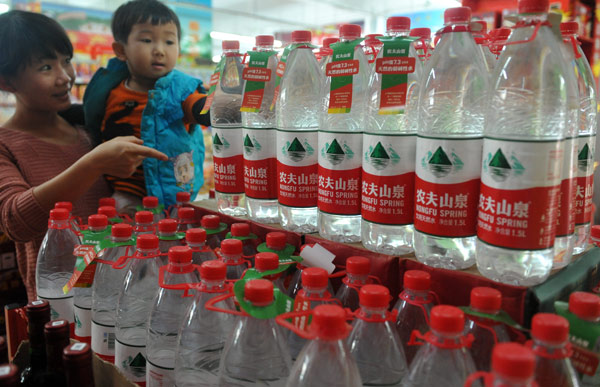Quality concerns over bottled water
Updated: 2013-04-17 07:42
By Wang Zhenghua in Shanghai and Yan Yiqi in Hangzhou (China Daily)
|
||||||||
A debate over the production standards adopted by bottled water giant Nongfu Spring has aroused safety concerns.
Several bottled water retailers in eastern China approached by China Daily said they have yet to see a major setback in sales of Nongfu Spring's bottled water, but some consumers remain skeptical about the quality of its products.
 |
|
A bottled water display in a supermarket in Qionghai, Hainan province, catches a child's interest on Saturday. Meng Zhongde / for China Daily |
More than two-thirds of 9,500 people polled by eastmoney.com said they believe the criteria Nongfu Spring uses is less strict than the national levels. And 86 percent of respondents said they will not buy the company's bottled water.
Nongfu Spring, which produces 21.8 percent of all bottled water in the Chinese market, has been under fire for allegedly having looser criteria on a number of chemical elements than the national tap water standards.
The Drinking Water Committee at the China National Health Association - a Beijing NGO supervised by the National Health and Family Planning Commission - accused Nongfu Spring of using criteria set by the government of Zhejiang province in 2005, which failed to be updated to meet the national tap water standards that were upgraded in 2007.
Research by China Daily found Nongfu Spring adopted the regional DB33/383 standards - as it is printed on its products' packages - rather than a national standard on "bottled natural drinking water".
In this standard adopted in Zhejiang from 2005, quality indexes in a number of elements are looser than GB5749-2006, a national standard the central government released in late 2006 for drinking water quality, or the quality of tap water.
For instance, the permitted amount of arsenic, which can cause skin cancer if ingested by humans, is no more than 0.01 milligrams per liter in the national standard. But in DB33/383, the allowed maximum amount is 0.05 mg/liter.
Dong Jinshi, secretary-general of the International Food Packaging Association in Hong Kong and a food safety expert, said that a company is allowed to adopt regional or industry criteria when a national standard is missing, as in the case of Nongfu Spring.
The national standards cannot always cover all products in the market because product innovation is very fast, he said. "But GB5749-2006 is currently the bottom line for regional governments and industries to formulate their own standards for drinking water.
"When drafting a regional or industry standard, all indexes should be stricter than the national level."
Li Shuguang, a professor at Fudan University's Public Health Institute, said the products could be "unsafe" if they fail to meet national standards.
"It is very hard to decide if it is toxic or what harm it can cause to humans if the water only meets regional criteria but fails the national one," he said.
"But the national criteria should be safe for everyone."
Authorities in Zhejiang declined to comment on Tuesday. However, in a joint statement released over the weekend, Zhejiang's Quality and Technical Supervision Department and its health department said that the quality standard for bottled water implemented in Zhejiang is the same as, if not stricter than, the national one.
The statement said the Zhejiang standard was drafted in 2002, when the national standard was not in place yet, and the provincial criteria for microorganisms in bottled water are the same as national standard after revision in 2005.
In statements Nongfu Spring made on its official micro blog over the weekend and on Monday, the company insisted its quality indexes in a number of toxic elements are two to 11 times stricter than the national level.
It accused a Beijing newspaper of "being ignorant" for "singling out several indexes in a whole system to generate conclusions on standards" and making groundless attacks.
The company said the recent attacks on its product quality were set in motion by one of its rivals C'estbon Food and Beverage. The Shenzhen-based company denied having made the accusation.

 In Photos: 7.0-magnitude quake hits Sichuan
In Photos: 7.0-magnitude quake hits Sichuan
 Premier heads for quake-hit zone in Sichuan
Premier heads for quake-hit zone in Sichuan
 Li Na on Time cover, makes influential 100 list
Li Na on Time cover, makes influential 100 list
 FBI releases photos of 2 Boston bombings suspects
FBI releases photos of 2 Boston bombings suspects
 World's wackiest hairstyles
World's wackiest hairstyles
 Sandstorms strike Northwest China
Sandstorms strike Northwest China
 Never-seen photos of Madonna on display
Never-seen photos of Madonna on display
 H7N9 outbreak linked to waterfowl migration
H7N9 outbreak linked to waterfowl migration
Most Viewed
Editor's Picks

|

|

|

|

|

|
Today's Top News
Live report: Hundreds feared dead or injured in M7.0 Sichuan quake
Boston suspect cornered on boat
Cross-talk artist helps to spread the word
'Green' awareness levels drop in Beijing
Palace Museum spruces up
First couple on Time's list of most influential
H7N9 flu transmission studied
Trading channels 'need to broaden'
US Weekly

|

|







